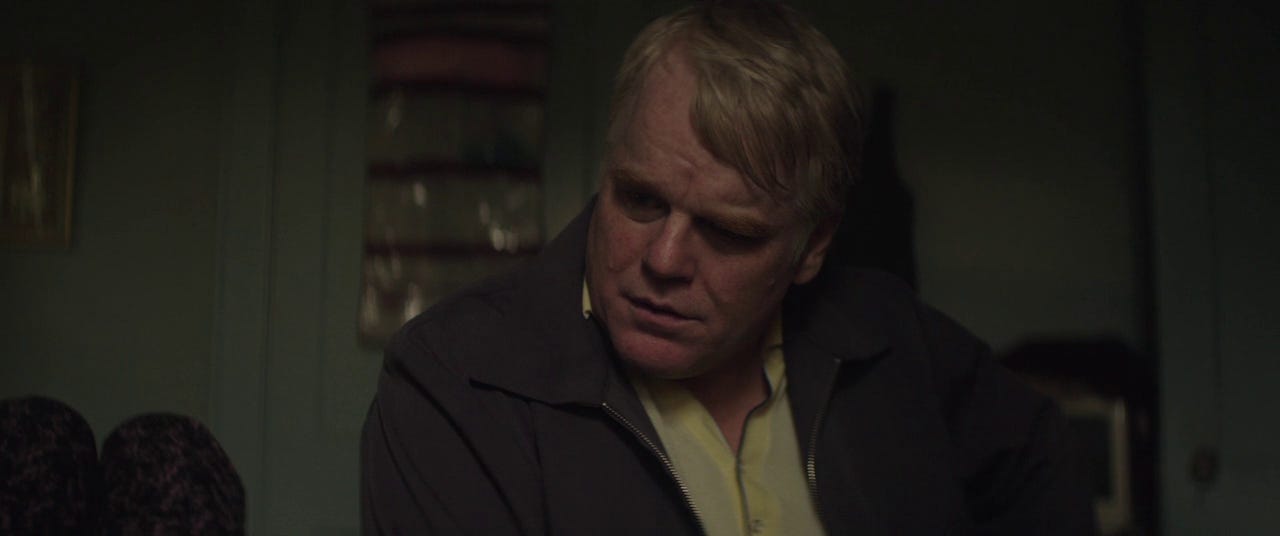God’s Pocket (2014) and a final farewell to Philip Seymour Hoffman (part 1)
“I’ve been writing the story of this city for 20 years”

I miss the screen presence of the one, the only, Philip Seymour Hoffman.
I’ve seen 24 of his 52 officially credited big screen performances and during my 13 years of writing award winning spoiler free film reviews I’ve penned my thoughts on 11 of these films, from Paul Thomas Anderson’s debut feature Sydney AKA Hard Eight, through his continuing collaboration with Paul, his dalliance with the Coen Brothers in the magnificent The Big Lebowski, arguably the greatest bad guy the Mission: Impossible franchise has seen to date, his incredible performance in Charlie Kaufman’s strangely beautifully depressing Synecdoche, New York, through to God’s Pocket here and, coming soon, his final ever film in the underrated A Most Wanted Man. So this is part 1 of 2 and Philip’s final two films (I’m ignoring the abomination that is The Hunger Games franchise for many and varied reasons) but it has to be said, God’s Pocket, whilst Philip is very good, the film surrounding him is just plain dreadful.
With the far, far better A Most Wanted Man to follow, I’ll keep this treatise brief and to the point. Firstly, for any new readers, welcome, and please help yourself to the chocolate biscuits on the table in the corner of the room and a confession: I have a fetish for debut films from first time filmmakers. It’s just that John Slattery’s direction, whilst admirable and I enjoyed the running themes as briefly described below as well as the gritty, dirty and intensely localised story being told, all I found was a film of characters appearing and disappearing at will, some incredibly clunky scenes (especially with Philip Seymour Hoffman and Eddie Marsan midway through the film), and plot holes leading to great chasms in the story with one in particular (which I’ll leave absent for spoiler reasons) completely ended my interest in a film I really hated when I first watched it shortly after Philip’s sad death, and time and last night’s rewatch hasn’t tempered this opinion one iota. Philip is great, John Turturro and Christina Hendricks too, and whilst I admire the great Richard Jenkins, I didn’t admire the character he plays here or the ginormous leap the film takes with his role.
Is God’s Pocket a dark comedy, a drama, a mix of the two? There’s a great story to be told here of a tight knit working class community that looks after its own and refuses to bow down to outside influences and is proud of its, albeit tarnished, roots and traditions. I just didn’t find that film here.
A Most Wanted Man — Coming Soon!
First, here are the opening 10 minutes to God’s Pocket:
Simple white on black opening credits introduce first the headline star only and Philip Seymour Hoffman before a simple “GOD’S POCKET” gives way to a yellow and green coloured hue that saturates so many scenes in the coming film. Although the opening credits continue in a more simple form throughout the coming minutes, our attention is drawn to the dirty and murky yellow/green colour scheme and “Smiling Jack Moran” (Eddie Marsan) leading “Mickey Scarpato” (Philip Seymour Hoffman) and wife “Jeanie Scarpato” (Christina Hendricks) to the front seats of his funeral parlour and the beginning of their son’s funeral. As he does so, a somewhat matter of fact and solemn narration begins:
“The working men of God’s Pocket are simple men”
As first time director John Slattery moves his camera throughout the assembled mourners, the simple guitar strings of Nathan Larson’s music soundtrack accompanies the camera moves and the narration continues:
“They work, they follow their teams, they marry and have children, who rarely leave the Pocket”
We cut to Jeanie sobbing and inconsolable as Mickey, dressed in a yellow and green coloured suit and tie as he seemingly merges with the colour hue surrounding him, looks at his grieving wife beside him, unable to help in any way. Slattery continues to move his camera in and around the gathered mourners as the narration continues:
“Everyone here has stolen something from someone else or when they were kids, they set someone’s house on fire, or they ran away when they should have stayed and fought”
Outside now and with a distant camera capturing the mourners filing out of the funeral parlour, someone punches Smiling Jack, sending him sprawling down the entrance steps to his parlour as we quickly cut to the formal, outside burial of Jeanie and Mickey’s son, a small crowd of mourners gathered around the coffin.
“They know who cheats at cards and who slaps their kids around”
Smiling Jack, looking thoroughly displeased with life is caught in close-up, two pieces of gauze jammed inside his nostrils in a vain attempt to stop the profuse bleeding from his nose and Jeanie, overcome with grief, is surrounded on all sides by a concerned gaggle of sisters and friends.
“And no matter what anybody does, they’re still here. And whatever they are is what they are”
We cut briefly to Mickey trying in vain to console Jeanie who after turning away from her husband, the opening narration comes to an end:
“And the only thing they can’t forgive is not being from God’s Pocket”
FADE TO BLACK and “Three Days Earlier”
We cut to a voyeuristic slither of early morning light into the bedroom of Jeanie and Mickey as they make loud, frantic and passionate love and leaving a naked Mickey still in bed, a now dressed Jeanie raps on the bedroom door of her son “Leon” (Caleb Landry Jones) with a message from his stepfather: If he wants a lift to work he must be up, out of bed in his truck at 8am sharp. Hearing this, we see Leon dragging himself reluctantly out of bed, before immediately rummaging through a discarded pair of trousers nearby and swallowing a couple of pills as an immediate cut finds Jeanie at the breakfast table reading aloud from The Daily Times newspaper and the exact passage as used in the film’s opening narration. A local God’s Pocket native, Jeanie exclaims the writer of the piece has her birthplace and neighbourhood to a tee and “Richard Sheldon has got it right”, to which Mickey scoffs before Jeanie rather dismissively puts him in his place and “If you were from here, you’d get it”. Mickey can only respond to his now disinterested wife “That’s what everyone tells me”. Upstairs and still only partially dressed, Leon pulls a flick knife from the back of his trousers before taking yet more early morning pills and staring at his bedroom mirror imitates (in a fashion) Robert De Niro in Taxi Driver as he exclaims to his reflection “Fuck you looking at?”. Now racing down the stairs, Jeanie intercepts him before he leaves the house with a pack of sandwiches and a loving kiss on the cheek as we now see Leon bounding out of the house, ignoring his stepfather’s lament that he’s already 10 minutes late for his meeting before dumping the sandwiches out of the car window with disdain and asking Mickey “Can you spot me 20 bucks?”.
We cut to “Bird” (John Turturro) and “Sal” (Domenick Lombardozzi) shooting the early morning shit in Bird’s car as they await the late arrival of Mickey. Now in the car and driving out of the city, director Slattery merges overhead shots of the car leaving the city with Mickey extolling the virtues of his latest surefire winner at the racetrack and his utter confidence that despite the horse’s poor showing in its last race, he’s onto a winner. From Mickey seen briefly in the back of the car we cut to his stepson Leon at work (the yellow/green colour palette of the film returns once more) who despite the early hour of the morning already appears dishevelled yet very highly strung. He throws a disgusting and intimidatory racist remark at a far more senior black work colleague before swallowing yet more pills and pulling his flick knife once more which he hides when confronted by his boss amid a flippant lie and “I ain’t said a word all morning”.
From stepson to stepfather once more as Mickey, Bird and Sal arrive at a goods yard full of static containers and trucks as they look for their mark and the obviously agreed upon truck they’re here to steal and a “reefer” in Mickey’s words, or refrigerated lorry. With Sal leaving the car to “take a piss” between static containers, Mickey asks his great friend Bird why he’s here and “It doesn’t take three people to steal a lorry”. Bird simply replies that he owes Sal “a little money”. Finding the marked truck for their early morning acquisition, Bird assures the driver his work for the day is done and to take his time over a “nice breakfast” nearby and to leave it for an hour before returning in vain to look for his truck. The driver scoffs, ensuring a horrific punch to the stomach from Sal and with Bird now bending over the driver, reiterating again that the deal is done, his day is done, a nice breakfast awaits him and taking the keys from him, he tosses them to Mickey who looks at Sal with disgust, clearly questioning the wisdom of him being here at all let alone his verbal outburst and question as to why he felt the need to punch the driver. Mickey climbs into the cab of the lorry and drives away and an immediate cut later is seen in a far happier mood as the heist went (nearly) as smoothly as they all hoped and whilst not overly speeding, he catches the image of a stationary police car sitting in a layby as he drives past. Imploring the car and “don’t do it”, the police car almost immediately pulls out of the layby, sirens blaring. Panicking, Mickey watches the pursuing police car constantly in his rear view mirror as it closes in on Bird and Sal in the car behind following his truck, before the police car speeds past both the car and Mickey’s truck and quickly into the distance.
From stepfather to stepson, we now cut to Leon, waving around his flick knife amid tall tales for his co-workers at a mid-morning break at work…
Thanks for reading. I hope this message in a bottle in The Matrix finds you well, prospering, and the right way up in an upside down world.
Whilst you’re here I may as well brag about the release of my trilogy of recently self-published books. Beautiful covers eh! As the title(s) would suggest, this is my life at the movies or at least from 1980 to 2024, and in volume 1 you’ll find 80 spoiler free appraisals of movies from debut filmmakers, 91 of the very best films appraised with love and absent of spoilers from 1990–2024 in volume 2, and in volume 3 you’ll find career “specials” on Paul Thomas Anderson and Quentin Tarantino together with the very best of the rest and another 87 spoiler free film reviews from 2001–2024.
All available in hardback and paperback and here are some handy links:
"A Life at the Movies Vol.1" - link to Amazon
"A Life at the Movies Vol.2" - link to Amazon
"A Life at the Movies Vol.3" - link to Amazon






Hoffman was my favorite actor of all time, and I put these postings of yours aside so I could truly savor them,
I love the performances in this otherwise-pedestrian movie, particularly Caleb Landry Jones' typically-loathsome turn. But Richard Jenkins seducing Sophia Takal and Christina Hendricks in the same movie? Science fiction.
Fromtheyardtothearthouse.substack.com